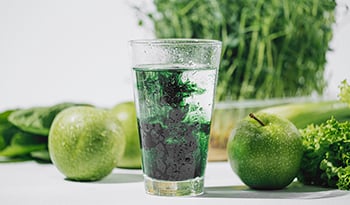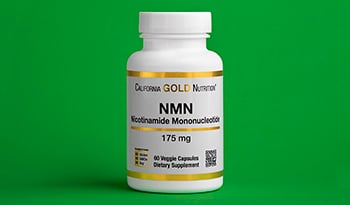Adrenal Gland Support: Fatigue from Stress + Helpful Foods and Supplements

Originally posted September 2017 / Updated October 2023
What Do Your Adrenal Glands Do?
Have you ever been exhausted and then all of a sudden felt a burst of energy? More than likely, that burst was due to the release of adrenaline and cortisol from your adrenal glands.
Your adrenals are a pair of glands that lie on top of each kidney.
If you have ever been suddenly frightened, you know what it feels like to have adrenaline surge through your body. Adrenaline boosts the body's energy to escape danger.
Our body has innate systems to help us respond to stress. However, our body's natural response mechanisms can have harmful effects when extreme, unusual, or long-lasting stress levels. "Allostatic load" describes the wear and tear accumulating with repeated or chronic stress.
One of the key factors determining the effects of overall stress and the allostatic load is the functioning of the adrenal glands. An abnormal adrenal response with either deficient or excessive hormone release significantly alters an individual's response to stress.
Excessive stress causes the body to go into allostasis, or the regulation of cellular functions to decrease the physiological consequences of stress on the body and brain.
What Is Adrenal Fatigue?
Often, when stress is severe, the adrenals become "exhausted" or "fatigued" because of the constant demands placed upon them. Adrenal exhaustion or fatigue is a common side effect of continual stress.
An individual with adrenal fatigue or exhaustion will suffer from chronic fatigue and may complain of feeling "stressed out." They will typically also have a reduced resistance to allergies and infection.
Lifestyle Practices and Adrenal Gland Support
One of the best ways to support the adrenal glands is by dealing with stress effectively. Coping with stress involves using techniques designed to reduce the adverse effects of stress.
Exercise and relaxation techniques such as meditation, prayer, biofeedback, and self-hypnosis are vital components of a stress management program. Exercise is itself a physical stressor. However, it is beneficial to incorporate the fight or flight response as part of the daily routine because regular exercise and physical activity increase the ability to cope with stress and reduce the risk of stress-related diseases.
Relaxation techniques seek to counteract the stress results by inducing its opposite reaction – relaxation. Although an individual may relax by simply sleeping, watching television, or reading a book, relaxation techniques are designed specifically to produce the "relaxation response."
The physiological effects of the relaxation response are opposite to those seen with stress. The relaxation response is designed for repair, maintenance, and restoration of the body.
Various techniques may be employed to achieve the relaxation response, e.g., meditation, prayer, progressive relaxation, self-hypnosis, and biofeedback. The type of relaxation technique best for each person is individual. The important thing is to dedicate at least 5 to 10 minutes daily to perform a relaxation technique. These sessions will also remind you to breathe in a relaxed, effective manner.
Foods for Adrenal Support
Foremost in the nutritional support of proper adrenal function is to eat a diet low in foods that quickly raise blood sugar levels. Avoid refined sugars, especially sucrose and high fructose corn syrup, pastries, doughnuts, beverages packed full of sugars (soft drinks, sports drinks, and many coffee beverages), and other high-sugar foods.
The sugars in these foods are quickly absorbed into the bloodstream, causing a rapid rise in blood sugar and severely stressing blood sugar control. Limiting starches, pasta, bread, and other carbohydrates to very small portions is also important.
Fluctuations in blood sugar severely stress adrenal function and commonly cause excess cortisol. Elevated cortisol levels are associated with increased stress and loss of appetite control, cravings for sugar, and weight gain. Too much cortisol is also linked to weakening the immune system, depression, loss of muscle mass, osteoporosis, cardiovascular disease, and brain atrophy.
Another dietary goal is to consume foods rich in potassium and avoid foods high in sodium. Most Americans have a potassium-to-sodium (K:Na) ratio of less than 1:2, meaning most people ingest twice as much sodium as potassium.
Researchers recommend a dietary potassium-to-sodium ratio of greater than 5:1 to maintain health. This ratio is ten times higher than the average intake. However, even this may not be optimal. A natural diet rich in fruits and vegetables can produce a K:Na ratio greater than 50:1, as most fruits and vegetables have a K:Na ratio of at least 100:1. For example, here are the average K:Na ratios for several common fresh fruits and vegetables:
- carrots 75:1
- potatoes 110:1
- apples 90:1
- bananas 440:1
- oranges 260:1.
To support the adrenals, the daily potassium intake should be at least 3 to 5 grams per day, and the sodium level should be no more than 1,500 mg daily.
Multivitamin Adrenal Gland Benefits
All essential nutrients are critical in supporting adrenal function. In particular, vitamin C, vitamin B, zinc, magnesium, and pantothenic acid are necessary nutrients for the manufacture of hormones by the adrenal glands.
Supplementation of all these nutrients at higher than recommended dietary intake levels in a high-potency multiple vitamin-mineral formula may be appropriate during high periods of stress or in individuals needing adrenal support.
Essential for optimal adrenal function is pantothenic acid. Pantothenic acid deficiency results in adrenal atrophy, which is characterized by fatigue, headache, sleep disturbances, nausea, and abdominal discomfort.
Pantothenic acid is found in whole grains, legumes, cauliflower, broccoli, salmon, liver, sweet potatoes, and tomatoes. In addition, if the adrenal glands need additional support, it is a good idea to take at least 100 mg of pantothenic acid daily.
Fish Oil Stress Benefits
Fish oils concentrated for EPA and DHA have been shown to have positive effects on patients with many different types of psychological disorders associated with stress, including anxiety and depression, indicating that EPA and DHA may exert an influence in blunting the stress response.
In an elaborate double-blind study conducted at Michigan Technological University, blood pressure, heart rate, muscle sympathetic nerve activity, and blood flow through the calf were recorded during a 5-minute experiment exposing 67 subjects to mental stress. The assessment was made before and after 8 weeks of fish oil or placebo supplementation. The dosage of fish oil provided a for total EPA+DHA of 2.7 g.
Results showed that fish oil reduced the increase in heart rate and muscle sympathetic nerve activity produced by mental stress. These results indicate that fish oils reduce stress's effects on activating the sympathetic nervous system.
The takeaway message is that fish oils and your ability to deal with stress are also good for your brain and heart.
GABA Calming Benefits
PharmaGABA is a natural form of GABA (gamma-aminobutyric acid) produced by Lactobacillus hilgardii, a probiotic bacteria used in the making of the traditional Korean vegetable kimchi. GABA– an important brain chemical.
Supplementation with PharmaGABA has been shown to promote feelings of calmness but with greater mental focus and clarity. It is a fantastic immediate stress buster, lowers the adrenal gland's production of stress hormones, and improves sleep quality with daily use. Studies have shown that PharmaGABA can promote brain wave changes reflective of feelings of calmness within 5 minutes after taking it. Dosage: 100 to 200 mg up to three times daily.
Ginseng, Rhodiola, Ashwagandha Adrenal Benefits
Several herbal supplements may help support adrenal function. Most notable are Chinese or Korean ginseng (Panax ginseng), rhodiola (Rhodiola rosacea), and ashwagandha (Withania somnifera).
All of these plants benefit adrenal function and enhance stress resistance and are often referred to as "adaptogens" because they help us adapt to (cope with) stress. These plants have historically been used to:
- Restore vitality.
- Increase feelings of energy.
- Improve mental and physical performance.
- Prevent the adverse effects of stress and enhance the body's response to stress.
These herbs can be used individually or in combination. All these herbs have considerable support from results in clinical trials to help deal with stress and balance adrenal function. There are some subtle differences. Here are some guidelines to help you choose the right adaptogen for you.
Chinese or Korean Ginseng (Panax ginseng)
Panax ginseng is regarded as the best choice for those recovering from significant stress or illness or who have used corticosteroids such as prednisone for more than six months.
It may also be the best for those dealing with the stress of working a night shift. In a double-blind clinical study of nurses, those who were given Panax ginseng demonstrated higher scores in mood and mental and physical performance compared with those receiving the placebo.
The nurses taking the Panax ginseng also felt more alert yet more tranquil and were able to perform better than the nurses who were not taking the ginseng. Some studies have also found Panax ginseng to help physical performance, endurance, and recovery.
The typical dosage recommendation for a Panax ginseng extract is based on ginsenosides content. For example, for a 4% ginsenoside content, the dosage is 250 mg one to three times daily. For a 10% ginsenoside content, 100 mg one to three times daily.
Rhodiola Rosea (arctic root)
Rhodiola is native to high altitudes throughout Russia, the Republic of Georgia, and Scandinavia, where it has traditionally been recommended to help combat fatigue and restore energy.
Rhodiola offers an advantage over other adaptogens in circumstances of acute stress because it produces a greater immediate feeling of relaxation and anti-anxiety effects.
A single dose of Rhodiola extract before acute stressful events has been shown to prevent some of the adverse effects that stress causes in mental and physical performance. Still, as with other adaptogens, long-term use has also produced positive results.
For example, in a double-blind study of sixty men and women between 20 and 55 years of age with chronic fatigue who were given either a standardized extract of Rhodiola (576 mg extract per day) or a placebo, those taking Rhodiola showed significant improvements in a clinical measure of fatigue as well as measures of mental performance.
Rhodiola extract also lowered morning cortisol levels, indicating an anti-stress effect in these subjects. Studies have shown that rhodiola extract given before exercise can prolong stamina and performance. The ability of Rhodiola to boost mood and reduce feelings of stress is the most well-supported health benefit in terms of the amount and quality of the clinical studies.
Based on the results of human clinical trials with standardized rhodiola extracts, the dosage is a target of 3.6 to 7.2 mg of rosavin per day. So, for a 1% rosavin content extract, the daily dose would be 360 to 720; for 2% rosavin, 180 to 360 mg; and 3% rosavin, 120 to 240 mg.
Ashwagandha (Withania somnifera)
Ashwagandha is one of the world's most important and historical herbal medicines. High-quality standardized ashwagandha extracts have considerable support in the medical literature as adaptogens; the most well-researched extracts are Sensoril (standardized to contain 10% withanolides) and KSM-66 (standardized to contain 1.5% withanolides).
Both have shown impressive clinical results in dealing with stress.
Ashwagandha goes a long way in helping to combat stress because it lowers the adrenal stress hormone cortisol while at the same time increasing the anti-stress adrenal hormone DHEA. Ashwagandha also improves sleep quality. As a result, it boosts energy levels, mood, and the threshold for feeling stressed.
While ashwagandha can produce an anti-stress effect in those who are severely stressed, it has also been shown to improve the quality of life and mental and physical capacity of healthy subjects.
For the correct ashwagandha dosage, choose one of the two extracts with exceptional scientific support, KSM-66 or Sensoril, and follow label instructions.
Limit Caffeine Consumption
There is no question that caffeine is a stimulant that can increase both physical and mental activity. Still, that increase often comes at the price of poor sleep quality and overstimulation of the adrenal gland.
While many Americans ingest too much caffeine, cultures all around the globe have safely and enthusiastically utilized traditional beverages containing moderate amounts of caffeine to help them make it through the day with higher energy levels. Coffee, green tea, guarana, cola nut, and cocoa are good examples.
Green tea is an excellent source of natural caffeine and plant compounds that tend to lessen some of the adverse effects of caffeine, such as anxiety and nervousness. For example, green tea, especially the matcha form, also provides the compound L-theanine that counteracts some of the effects of caffeine on the brain, which can lead to nervousness and interference with sleep. L-theanine is also available as a dietary supplement. In human clinical studies, L-theanine supplementation has been shown to improve stress-related effects and boost brain function.
There are a few situations where I do not recommend consuming any significant amount of caffeine (e.g., daily intakes of more than 30-50 mg), including people susceptible to caffeine or those with insomnia, depression, anxiety, chronic fatigue, fibrocystic breast disease, or high blood pressure. If you suffer from one of these conditions and seek to increase your energy levels, try taking one of the adaptogenic herbs described above.
References:
- Moyers SA, Hagger MS. Physical activity and cortisol regulation: A meta-analysis. Biol Psychol. 2023 Apr;179:108548.
- Lopez-Cepero A, Rosal MC, Frisard C, Person S, Ockene I, Tucker KL. Changes in Glycemic Load Are Positively Associated with Small Changes in Primary Stress Markers of Allostatic Load in Puerto Rican Women. J Nutr. 2020 Mar 1;150(3):554-559.
- Jones C, Gwenin C. Cortisol level dysregulation and its prevalence-Is it nature's alarm clock? Physiol Rep. 2021 Jan;8(24):e14644.
- Liao Y, Xie B, Zhang H, He Q, Guo L, Subramanieapillai M, Fan B, Lu C, McIntyre RS. Efficacy of omega-3 PUFAs in depression: A meta-analysis. Transl Psychiatry. 2019 Aug 5;9(1):190.
- Su KP, Tseng PT, Lin PY, et al. Association of Use of Omega-3 Polyunsaturated Fatty Acids With Changes in Severity of Anxiety Symptoms. A Systematic Review and Meta-analysis. JAMA Network Open. 2018;1(5):e182327.
- Carter JR, Schwartz CE, Yang H, Joyner MJ. Fish oil and neurovascular reactivity to mental stress in humans. Am J Physiol Regul Integr Comp Physiol. 2013 Apr 1;304(7):R523-30.
- Hepsomali P, Groeger JA, Nishihira J, Scholey A. Effects of Oral Gamma-Aminobutyric Acid (GABA) Administration on Stress and Sleep in Humans: A Systematic Review. Front Neurosci. 2020;14:923.
- Abdoua AM, Higashiguchia S, Horiea K, et al. Relaxation and immunity enhancement effects of Gamma-Aminobutyric acid (GABA) administration in humans. BioFactors 2006;26:201–208
- Fujibayashi M, Kamiya T, Takagaki K, Moritani T. Activation of autonomic nervous system activity by the oral ingestion of GABA. J Jpn Soc Nutr Food Sci 2008:61:129-133.
- Todorova V, Ivanov K, Delattre C, Nalbantova V, Karcheva-Bahchevanska D, Ivanova S. Plant Adaptogens-History and Future Perspectives. Nutrients. 2021 Aug 20;13(8):2861. doi: 10.3390/nu13082861. PMID: 34445021; PMCID: PMC8398443.
- Zhou G, Wang CZ, Mohammadi S, Sawadogo WR, Ma Q, Yuan CS. Pharmacological Effects of Ginseng: Multiple Constituents and Multiple Actions on Humans. Am J Chin Med. 2023;51(5):1085-1104.
- Hallstrom C, Fulder S, Carruthers M. Effect of ginseng on the performance of nurses on night duty. Comp Med East West 1982;6:277–282.
- Ikeuchi S, Minamida M, Nakamura T, Konishi M, Kamioka H. Exploratory Systematic Review and Meta-Analysis of Panax Genus Plant Ingestion Evaluation in Exercise Endurance. Nutrients. 2022 Mar 11;14(6):1185.
- Tao H, Wu X, Cao J, Peng Y, Wang A, Pei J, Xiao J, Wang S, Wang Y. Rhodiola species: A comprehensive review of traditional use, phytochemistry, pharmacology, toxicity, and clinical study. Med Res Rev. 2019 Sep;39(5):1779-1850.
- Ivanova Stojcheva E, Quintela JC. The Effectiveness of Rhodiola rosea L. Preparations in Alleviating Various Aspects of Life-Stress Symptoms and Stress-Induced Conditions-Encouraging Clinical Evidence. Molecules. 2022 Jun 17;27(12):3902.
- Olsson EM, von Schéele B, Panossian AG. A randomised, double-blind, placebo-controlled, parallel-group study of the standardised extract shr-5 of the roots of Rhodiola rosea in the treatment of subjects with stress-related fatigue. Planta Med. 2009 Feb;75(2):105-12.
- Tinsley GM, Jagim AR, Potter GDM, Garner D, Galpin AJ. Rhodiola Rosea as an Adaptogen to Enhance Exercise Performance: A Review of the Literature. Br J Nutr. 2023 Aug 29:1-27.
- Cropley M, Banks AP, Boyle J. The Effects of Rhodiola rosea L. Extract on Anxiety, Stress, Cognition and Other Mood Symptoms. Phytother Res. 2015 Dec;29(12):1934-9.
- Akhgarjand C, Asoudeh F, Bagheri A, Kalantar Z, Vahabi Z, Shab-Bidar S, Rezvani H, Djafarian K. Does Ashwagandha supplementation have a beneficial effect on the management of anxiety and stress? A systematic review and meta-analysis of randomized controlled trials. Phytother Res. 2022 Nov;36(11):4115-4124
- Yenisetti SC, Manjunath MJ, Muralidhara C. Neuropharmacological Properties of Withania somnifera - Indian Ginseng: An Overview on Experimental Evidence with Emphasis on Clinical Trials and Patents. Recent Pat CNS Drug Discov. 2016;10(2):204-215
- Auddy B, Hazra J, Mitra A, et al. A standardized Withania somnifera extract significantly reduces stress-related parameters in chronically stressed humans: a double-blind, randomized, placebo-controlled study. JANA 2008;11:50–56.
- Cheah KL, Norhayati MN, Husniati Yaacob L, Abdul Rahman R. Effect of Ashwagandha (Withania somnifera) extract on sleep: A systematic review and meta-analysis. PLoS One. 2021 Sep 24;16(9):e0257843.
- Hidese S, Ogawa S, Ota M, et al. Effects of L-Theanine Administration on Stress-Related Symptoms and Cognitive Functions in Healthy Adults: A Randomized Controlled Trial. Nutrients. 2019;11(10):2362.
DISCLAIMER:This Wellness Hub does not intend to provide diagnosis...
















































































 Table of Contents
Table of Contents















